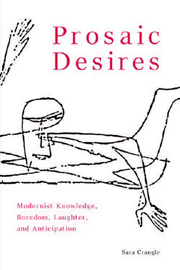Conclusion: Endlessnessnessness
Published online by Cambridge University Press: 12 September 2012
Summary
Heidegger's “Conversation on a Country Path about Thinking” advocates a willing renunciation of the human will, a theoretical stance remarkably akin to Levinasian patience, or anticipation without aiming. The essay was translated into English in 1966, the same year that saw the publication of an interview with Heidegger in the German journal Der Spiegel, a piece infamous among scholars for Heidegger's occasionally evasive and consistently unapologetic responses about the extent of his Nazi affiliations (Sheehan, “Only a God Can Save Us”). But the interview indicates as much about the post-war intellectual climate as it does about the political as a great deal of the discussion at hand is given over to Heidegger's reconceptualization of philosophy. While “Conversation on a Country Path” tacitly denounces the subjective angst crucial to Heidegger's early formulations of Da-sein, in the Der Spiegel interview Heidegger extends that repudiation to philosophy itself, stating, with no small hint of despair:
philosophy will be unable to effect any immediate change in the current state of the world. This is true not only of philosophy but of all purely human reflection and endeavour. Only a god can save us. The only possibility available to us is that by thinking and poetizing we prepare a readiness for the appearance of a god in [our] decline. (58)
Heidegger's apocalyptic sentiments are rooted in his belief that technology has become an alienating, monstrous force signaling a need for collective patience.
- Type
- Chapter
- Information
- Prosaic DesiresModernist Knowledge Boredom Laughter and Anticipation, pp. 174 - 193Publisher: Edinburgh University PressPrint publication year: 2010



